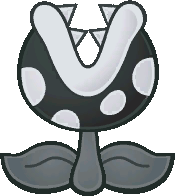Pale Piranha: Difference between revisions
No edit summary |
No edit summary |
||
| Line 1: | Line 1: | ||
{{merge to|Piranha Plant|Pale Piranha#Re-re-re-merge into Piranha Plant yet again: the Squeakwel}} | {{merge to|Piranha Plant|Pale Piranha#Re-re-re-merge into Piranha Plant yet again: the Squeakwel}} | ||
{{:Paper Mario: The Thousand-Year Door bestiary|transcludesection=Pale Piranha|image=[[File:Pale Piranha.png]]}} | {{:Paper Mario: The Thousand-Year Door bestiary|transcludesection=Pale Piranha|image=[[File:Pale Piranha.png]]}} | ||
'''Pale Piranhas''' are | '''Pale Piranhas''' are monochrome [[Piranha Plant]]s found in ''[[Paper Mario: The Thousand-Year Door]]''. They live in the [[Boggly Woods]] and [[the Great Tree]], and, as indicated, are colored in gray with white spots. They are the weakest of the four types of Piranha Plants in the game. In the [[Glitz Pit]], a Pale Piranha appears as one of the members of the [[Mind-Bogglers]]. They attack by biting [[Mario]]. When Mario comes near a Pale Piranha outside battle, it will try to bite Mario in a rush to make the [[First Strike]], causing him damage. If Mario attempts to jump on one, he will take damage. | ||
In all languages except the English localization, Pale Piranhas are considered the "normal" Piranha Plants, with the color simply being an adaptation to the monochrome environment, similar to the [[Cleft]]s in the same area; this includes the Spanish localization, despite having a color identifier in the name. In the English version, however, Goombella identifies them as a subspecies. | In all languages except the English localization, Pale Piranhas are considered the "normal" Piranha Plants, with the color simply being an adaptation to the monochrome environment, similar to the [[Cleft]]s in the same area; this includes the Spanish localization, despite having a color identifier in the name. In the English version, however, Goombella identifies them as a subspecies. In the game's English demo, however, they were treated as normal Piranha Plants.<ref>[[tcrf:Proto:Paper Mario: The Thousand-Year Door/Text & Dialogue#The Great Tree Enemies|TCRF]]</ref> | ||
==Names in other languages== | ==Names in other languages== | ||
| Line 19: | Line 19: | ||
|ItaM=Piranha Plant | |ItaM=Piranha Plant | ||
}} | }} | ||
==References== | |||
<references/> | |||
{{Piranha Plants}} | {{Piranha Plants}} | ||
Revision as of 15:55, August 25, 2021
| It has been suggested that this page be merged into Piranha Plant. (discuss) |
| The Thousand-Year Door enemy | |||||||||||||||||||||||||||||
|---|---|---|---|---|---|---|---|---|---|---|---|---|---|---|---|---|---|---|---|---|---|---|---|---|---|---|---|---|---|
| Pale Piranha | |||||||||||||||||||||||||||||

| |||||||||||||||||||||||||||||
| Location(s) | Boggly Woods, The Great Tree, Glitz Pit | ||||||||||||||||||||||||||||
| Max HP | 4 | ||||||||||||||||||||||||||||
| Attack | 2 | ||||||||||||||||||||||||||||
| Defense | 0 | ||||||||||||||||||||||||||||
| Moves | Jaw Clamp (2) | ||||||||||||||||||||||||||||
| Items | Honey Syrup (drop only) | ||||||||||||||||||||||||||||
| Coins | 1 - 2 | ||||||||||||||||||||||||||||
| Log | A monochrome Piranha Plant that attacks with a nasty bite. If you see one, throw all you've got at it, or run. | ||||||||||||||||||||||||||||
| |||||||||||||||||||||||||||||
| |||||||||||||||||||||||||||||
| Tattle Log #: 56 | |||||||||||||||||||||||||||||
Pale Piranhas are monochrome Piranha Plants found in Paper Mario: The Thousand-Year Door. They live in the Boggly Woods and the Great Tree, and, as indicated, are colored in gray with white spots. They are the weakest of the four types of Piranha Plants in the game. In the Glitz Pit, a Pale Piranha appears as one of the members of the Mind-Bogglers. They attack by biting Mario. When Mario comes near a Pale Piranha outside battle, it will try to bite Mario in a rush to make the First Strike, causing him damage. If Mario attempts to jump on one, he will take damage.
In all languages except the English localization, Pale Piranhas are considered the "normal" Piranha Plants, with the color simply being an adaptation to the monochrome environment, similar to the Clefts in the same area; this includes the Spanish localization, despite having a color identifier in the name. In the English version, however, Goombella identifies them as a subspecies. In the game's English demo, however, they were treated as normal Piranha Plants.[1]
Names in other languages
| Language | Name | Meaning | Notes |
|---|---|---|---|
| Japanese | パックンフラワー[?] Pakkun Furawā |
Pakkun Flower; same as Piranha Plant. | |
| German | Piranha-Pflanze[?] | Piranha Plant | |
| Italian | Pianta Piranha[?] | Piranha Plant | |
| Spanish | Planta Piraña Gris[?] | Gray Piranha Plant |